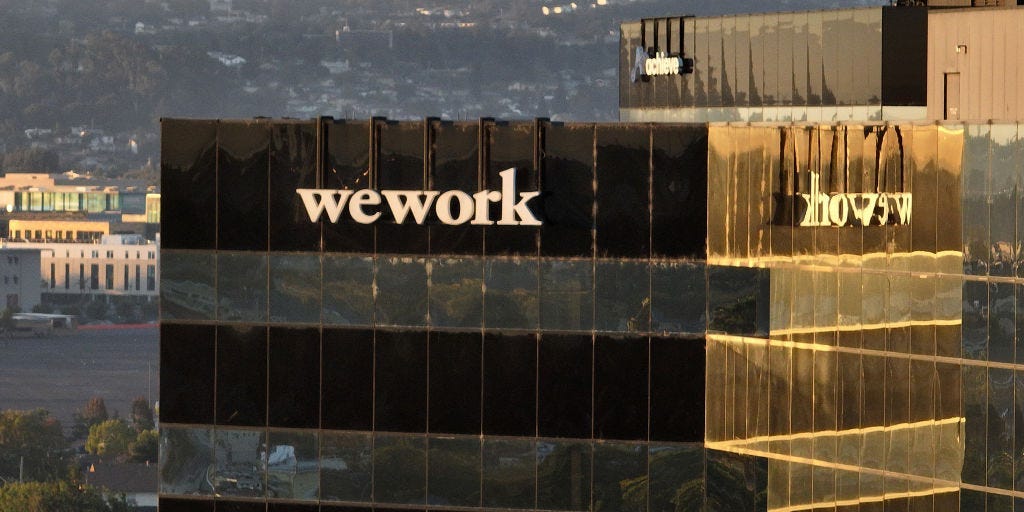- WeWork has filed for bankruptcy on Monday.
- On Monday, WeWork’s stock trading was halted ahead of the opening bell.
- The company’s valuation has plummeted since it first attempted to go public in 2019.
Embattled real estate giant WeWork filed for Chapter 11 bankruptcy on Monday.
Trading was halted for WeWork shares ahead of the opening bell on Monday morning. At the time, the stock was trading at about 84 cents per share.
The bankruptcy filing was expected following an October 31 report from The Wall Street Journal that said the company was planning to file for Chapter 11. At the time, WeWork said that it had come to an agreement with creditors to extend a 30-day grace period on some of its debt to November 6.
WeWork said in its Monday announcement it has entered into a restructuring support agreement with holders representing around 92% of its secured notes. Monday’s bankruptcy filing will not affect WeWork’s operations outside the US and Canada.
The company also said that its spaces remain open and operational.
However, the company added it will “further rationalize its commercial office lease portfolio” during its restructuring.
Its real-estate portfolio spanned 777 locations across 39 countries as of June 30.
“Now is the time for us to pull the future forward by aggressively addressing our legacy leases and dramatically improving our balance sheet,” David Tolley, the CEO of WeWork, said in the Monday announcement.
On Monday, WeWork cofounder and ex-CEO Adam Neumann — who resigned as chief executive in 2019, citing intense public scrutiny that had become a distraction in running the firm — said that he found news about the impending bankruptcy to be “disappointing.”
“It has been challenging for me to watch from the sidelines since 2019 as WeWork has failed to take advantage of a product that is more relevant today than ever before,” he said in a press release. “I believe that, with the right strategy and team, a reorganization will enable WeWork to emerge successfully.”
During its peak, the company was valued at $47 billion as a private company. But the startup has been in turmoil ever since its plans to go public in 2019 fell apart amid concerns about the company’s profitability and some of Neumann’s inappropriate antics.
Japanese investor SoftBank has dropped billions of dollars into the real estate startup and remains its majority shareholder. Yet, WeWork has never turned a profit. In the first half of the year, the company lost $696 million, per its most recent earnings.
Since 2019, the company’s valuation has continued to fall. In April, prices dropped below $1 per share and it faced the potential of being delisted from the New York Stock Exchange. And in August, WeWork said it had “substantial doubt” it would be able to stay in business much longer.
WeWork’s bankruptcy comes amidst a years-long reorientation for the office industry. Commercial real estate companies have struggled to recover from the pandemic’s seismic shift to remote work that weakened office demand worldwide, even in the wake of many companies shifting to a hybrid model or demanding employees return to the office full-time.
Bankruptcy might not be the end for WeWork, which currently operates over 300 locations worldwide. The Chapter 11 process allows companies to shed some debt and reorganize. (WeWork competitor Regus filed for bankruptcy in the US in 2003 and has continued to operate successfully.)
Wait, wasn’t WeWork already in trouble?
The company’s failed attempt to go public in 2019 made it the laughing stock of the business world — and led to a big financial life raft from SoftBank.
SoftBank needed WeWork to survive. At the time, the Japanese firm was raising money for a second mega-venture capital fund (the first had collected $100 billion) and WeWork’s spiral didn’t inspire confidence for potential investors. To save WeWork, the Japanese tech giant invested billions into the company and installed a seasoned executive team tasked with turning it around. In 2019 and early 2020, WeWork cut thousands of employees, dozens of office leases, and perks like free beer, all as it faced multiple government investigations.
“We made a failure on investing in WeWork and I’ve been admitting that several times I was foolish,” SoftBank founder Masayoshi Son said on a May 2020 earnings call. At the time, SoftBank had written down its WeWork valuation to $2.9 billion.
WeWork’s woes continued. Less than a month after its new CEO started in 2020, the pandemic hit (one of the first public New York coronavirus cases was traced back to a man who worked out of a WeWork location.) Offices globally emptied, and the once-stable commercial real estate sector was thrown into unprecedented chaos, from which it has not fully recovered. WeWork’s new leadership team spun the pandemic as an opportunity: Companies rethinking their office needs would flock to more flexible arrangements than decades-long leases, and remote workers would crave workspaces outside their homes.
As the world reopened, some WeWorks bounced back – but the company still had too many locations. CEO Sandeep Mathrani continued cutting leases signed under Neumann and found fresh financing. In 2021, WeWork started trading publicly through a special purpose acquisition company, a common way at the time for startups to enter the public markets outside the traditional IPO process. The deal valued the company at $9 billion.
“Sure, this is a story where a lot of people wrote documentaries that it was the end of WeWork,” the company’s chairman at the time, Marcelo Claure, told CNBC on the first trading day. “The persistence of these people is incredible. This company is here, is stronger than ever, and no doubt that we’re going to be celebrating many more milestones.”
Read the full article here





